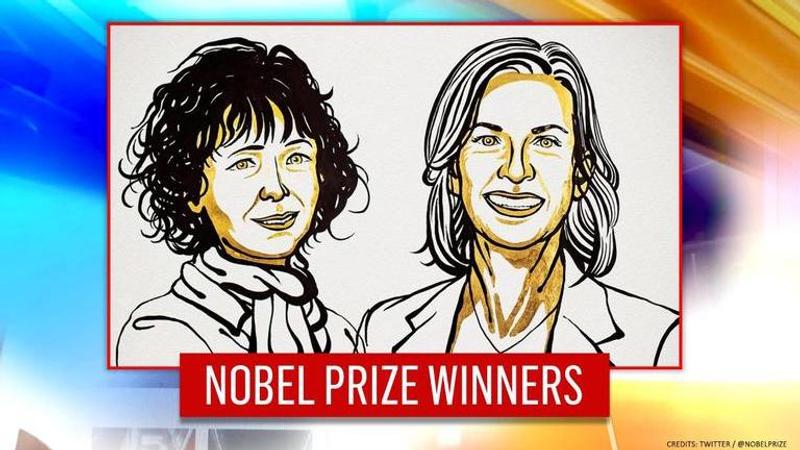Published 15:47 IST, October 7th 2020
Nobel Prize in Chemistry 2020: Two scientists awarded for discovering genome editing tool
The Nobel Prize in Chemistry 2020 has been awarded jointly to Emmanuelle Charpentier and Jennifer A. Doudna "for the development of a method for genome editing.

The Nobel Prize in Chemistry 2020 has been awarded jointly to Emmanuelle Charpentier and Jennifer A. Doudna "for the development of a method for genome editing." The Royal Swedish Academy of Sciences said in a statement that Chemistry Laureates Charpentier and Doudna discovered one of gene technology’s sharpest tools - the CRISPR/Cas9 genetic scissors.
“Using these, researchers can change the DNA of animals, plants and microorganisms with extremely high precision,” the Academy added.
It stated that the CRISPR/Cas9 genetic scissors have revolutionised the molecular life sciences, brought new opportunities for plant breeding, are contributing to innovative cancer therapies and may make the “dream of curing inherited diseases come true.” Claes Gustafsson, chair of the Nobel Committee for Chemistry, said in a statement that the genetic tool not only revolutionised basic science but also resulted in innovative crops and will lead to ground-breaking new medical treatments,
“There is enormous power in this genetic tool, which affects us all,” said Gustafsson.
Breakthrough in genome editing technology
Charpentier published her discovery in 2011 and, later in the year, initiated a collaboration with Doudna. They succeeded in recreating the bacteria’s genetic scissors in a test tube and simplifying the scissors’ molecular components so they were easier to use. The duo then reprogrammed the genetic scissors.
The Royal Swedish Academy of Sciences further stated that this tool has contributed to many important discoveries in basic research, and plant researchers have been able to develop crops that withstand mould, pests and drought. The added that these genetic scissors have taken the life sciences into a “new epoch and, in many ways, are bringing the greatest benefit to humankind.”
Born in 1968 in France, Charpentier finished PhD in 1995 from Institut Pasteur, Paris and workers as Director of the Max Planck Unit for the Science of Pathogens, Berlin, Germany. US-born Doudna completed PhD from Harvard Medical School, Boston, and worked as a Professor at the University of California, Berkeley, USA and Investigator, Howard Hughes Medical Institute. The prize amount of 10 million Swedish kronor will be shared equally between the Laureates.
Updated 15:46 IST, October 7th 2020




